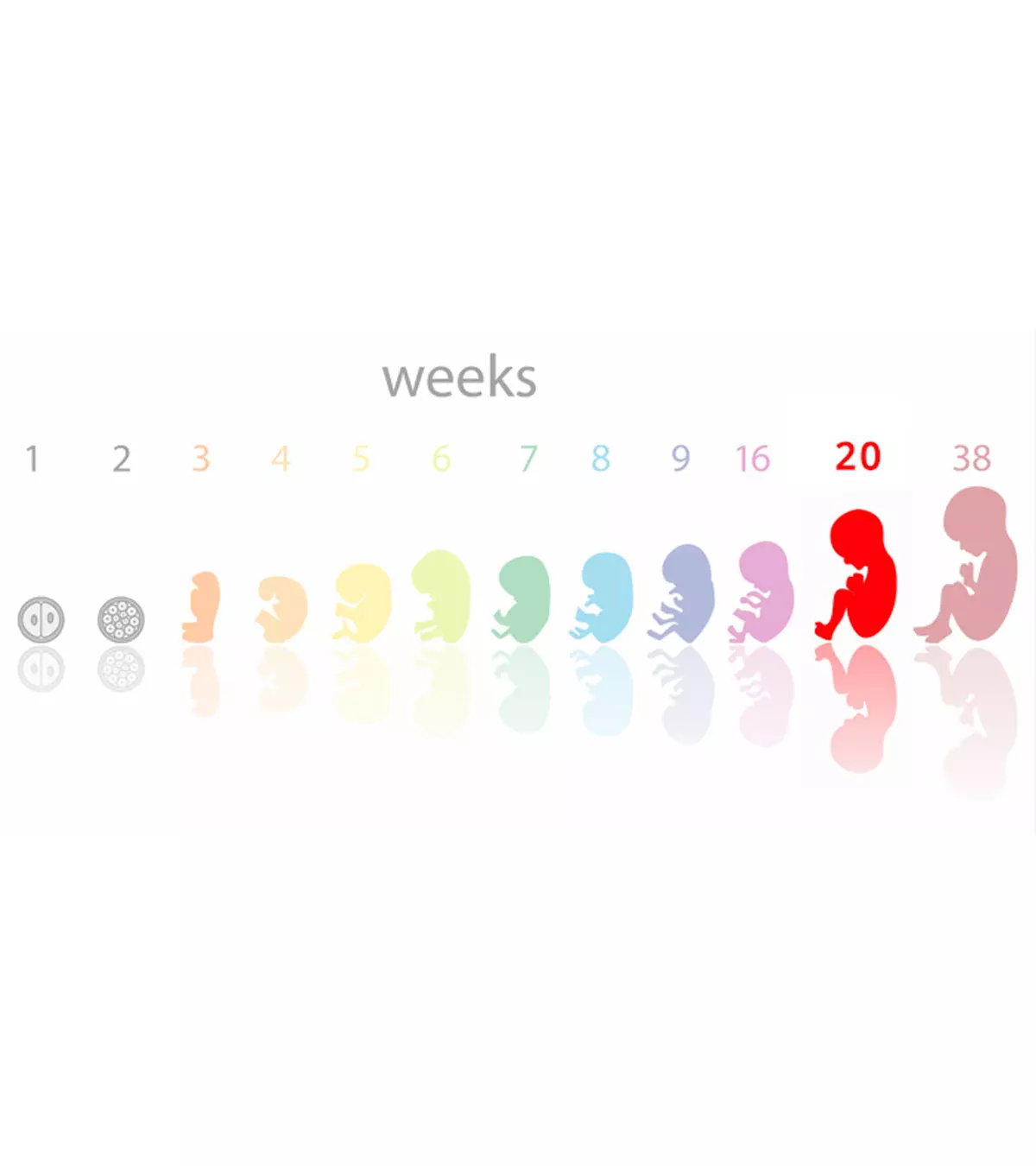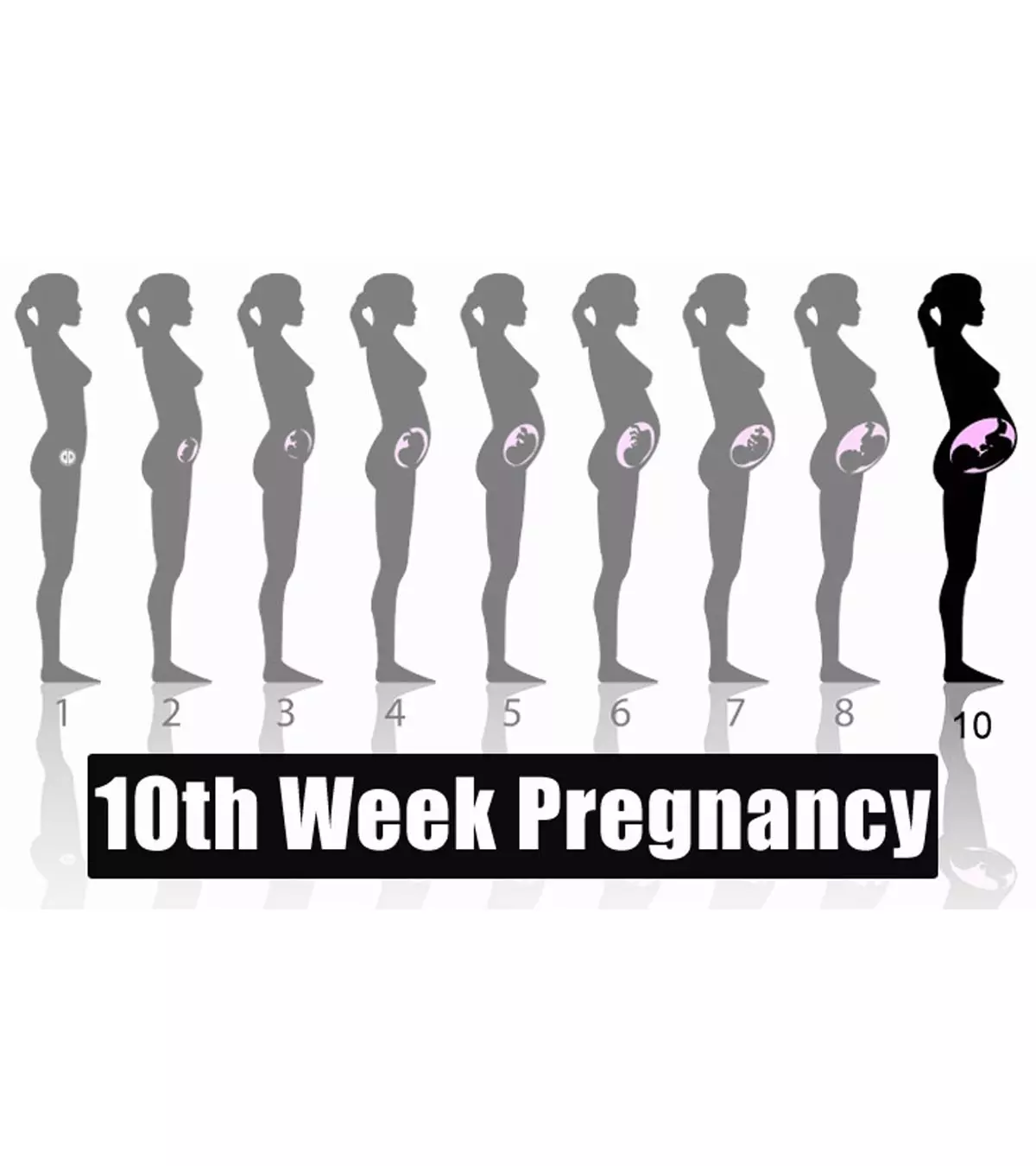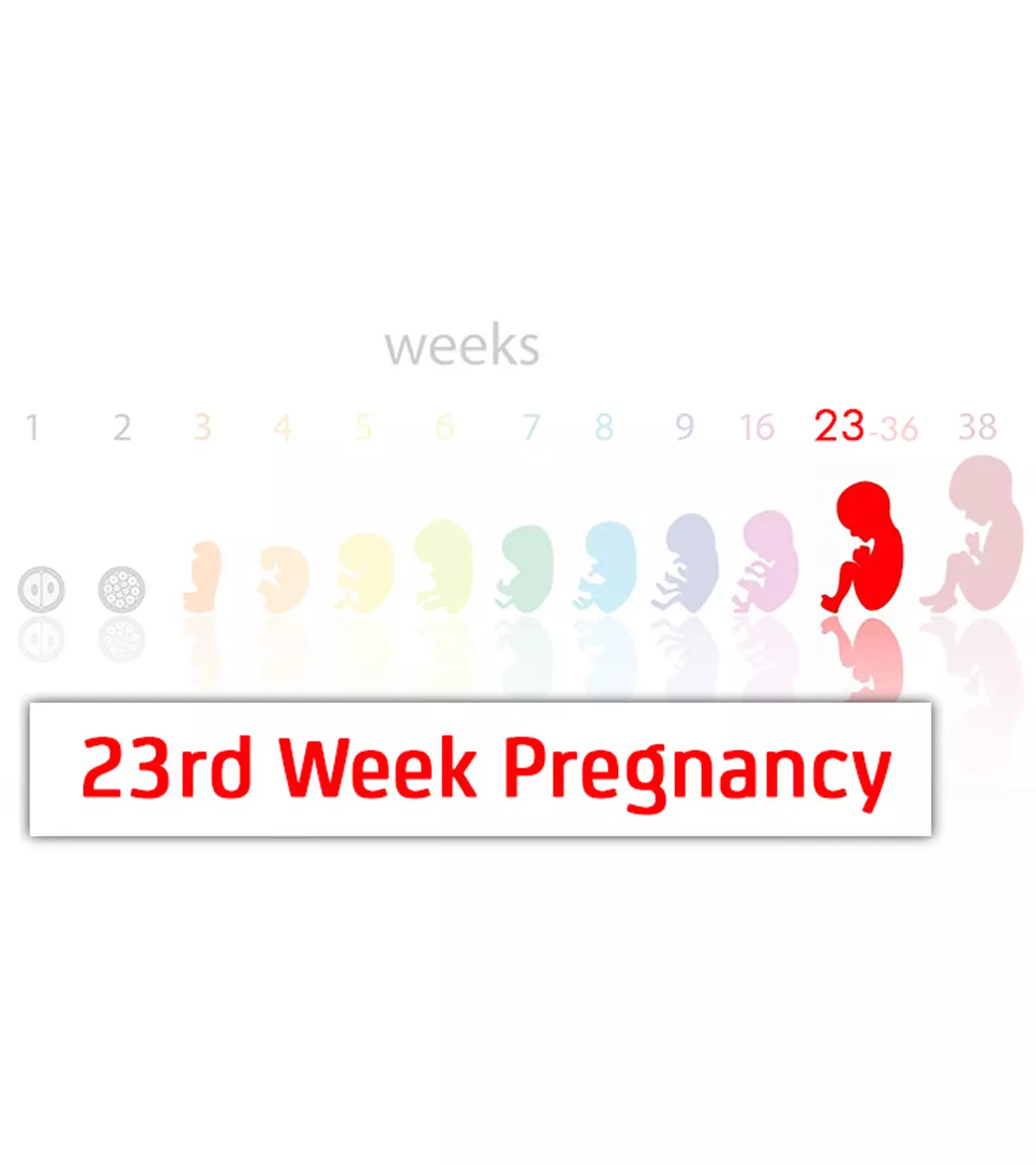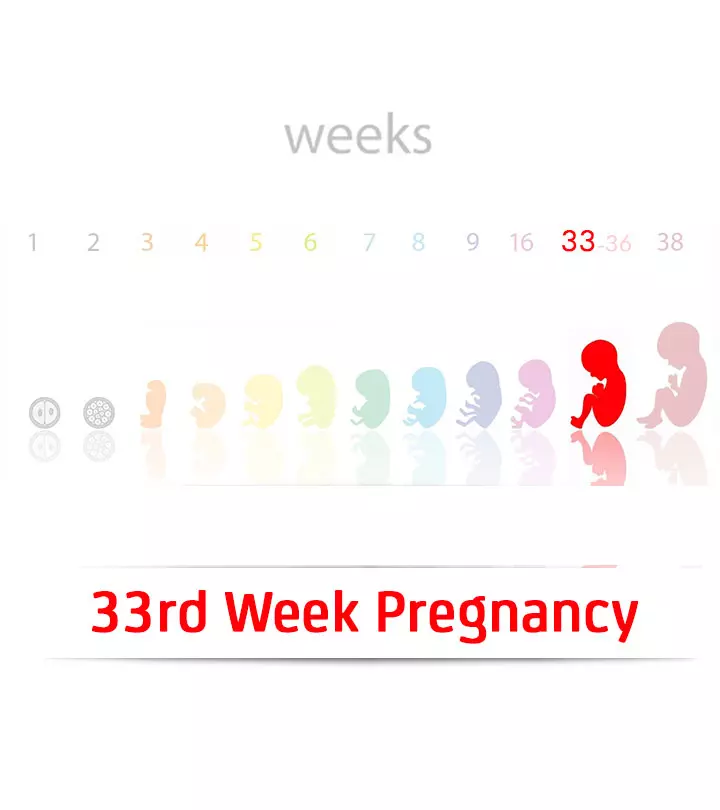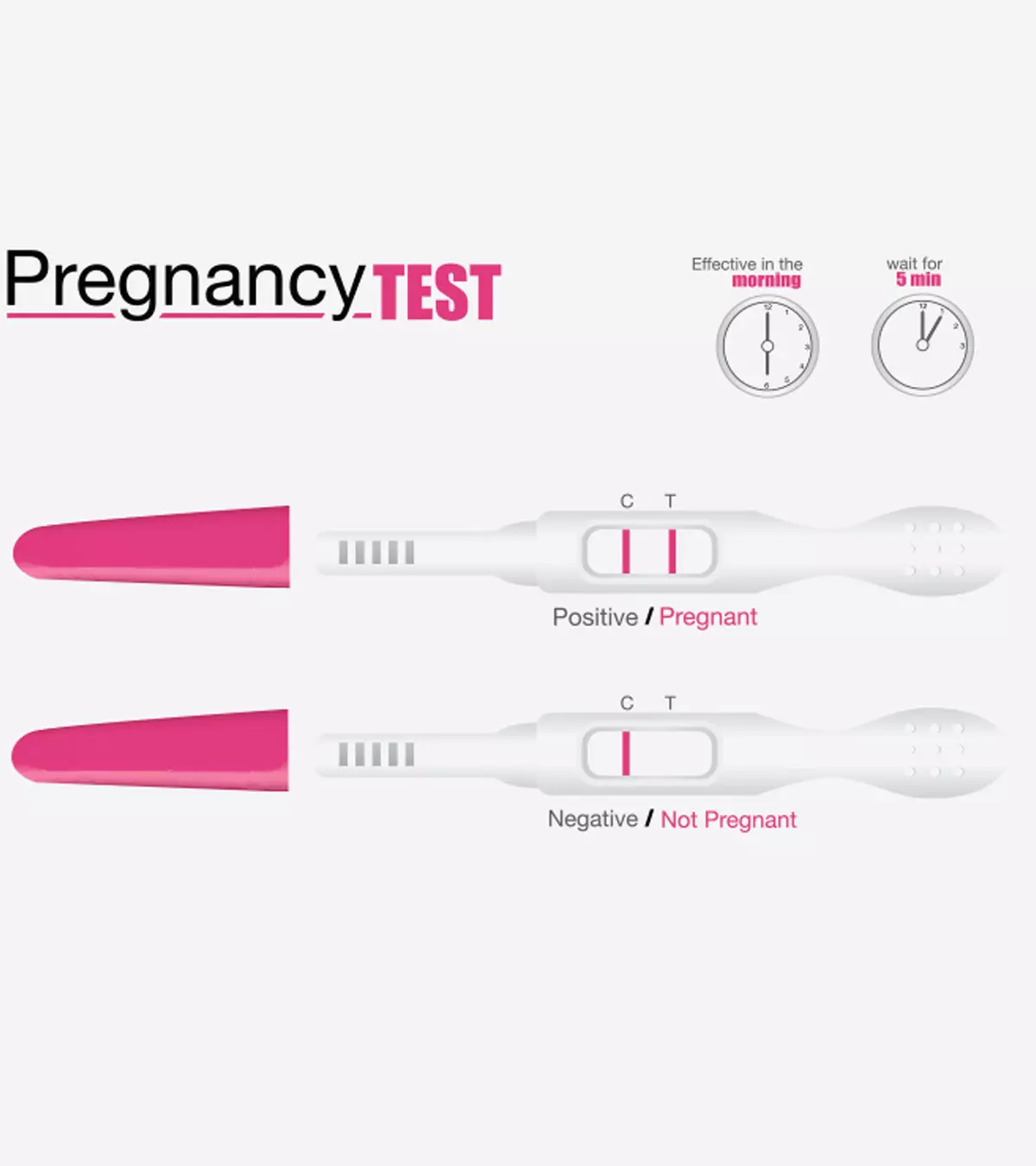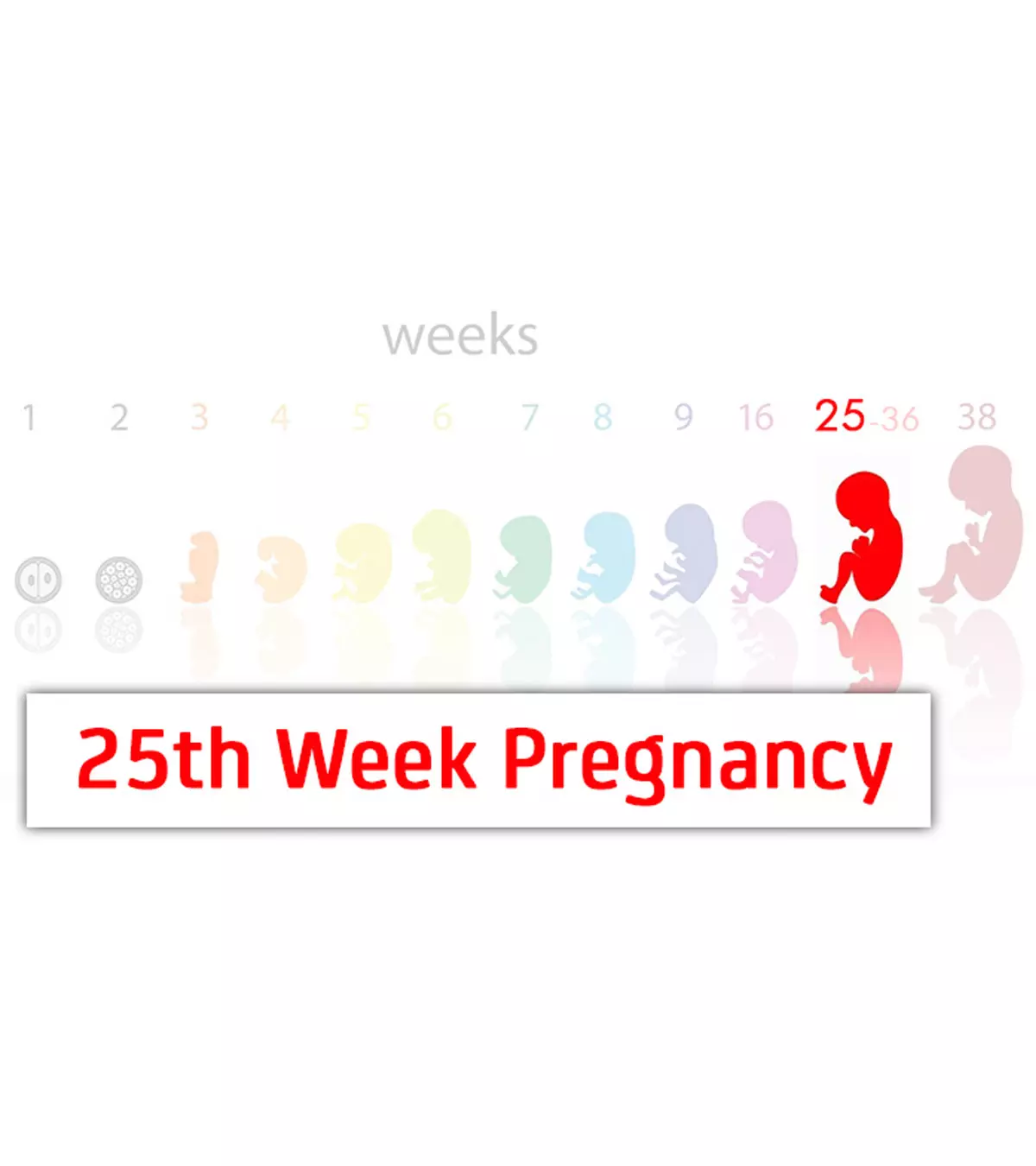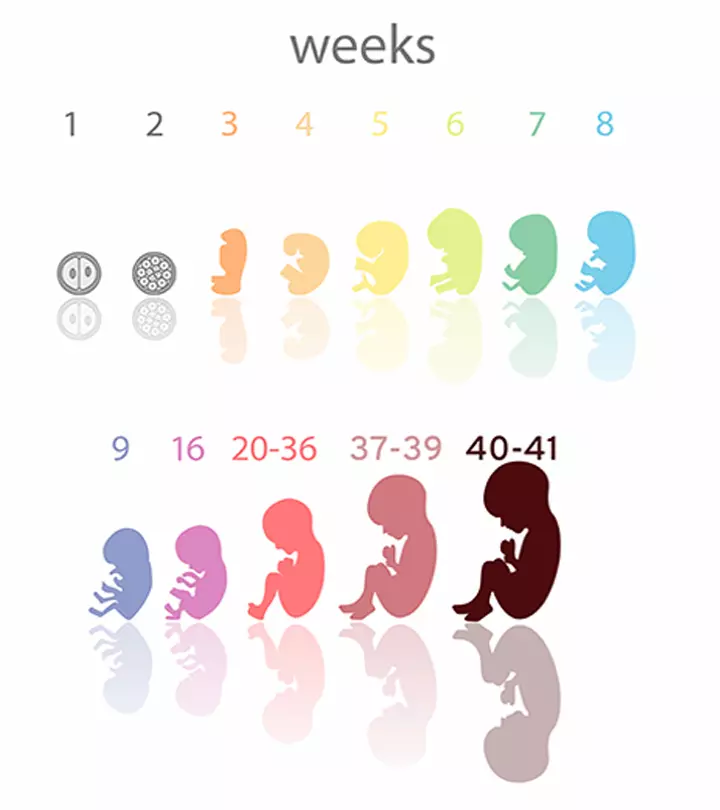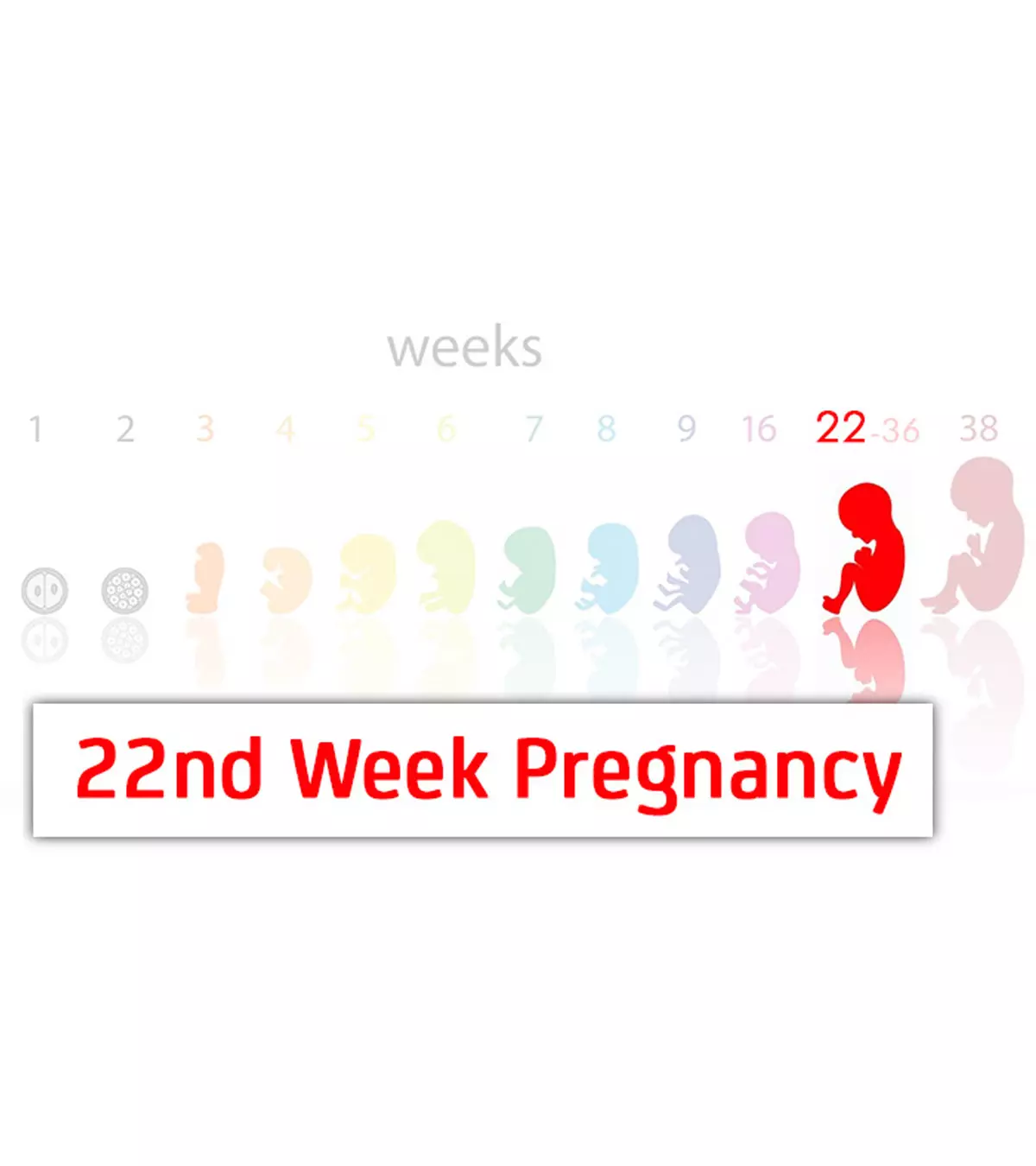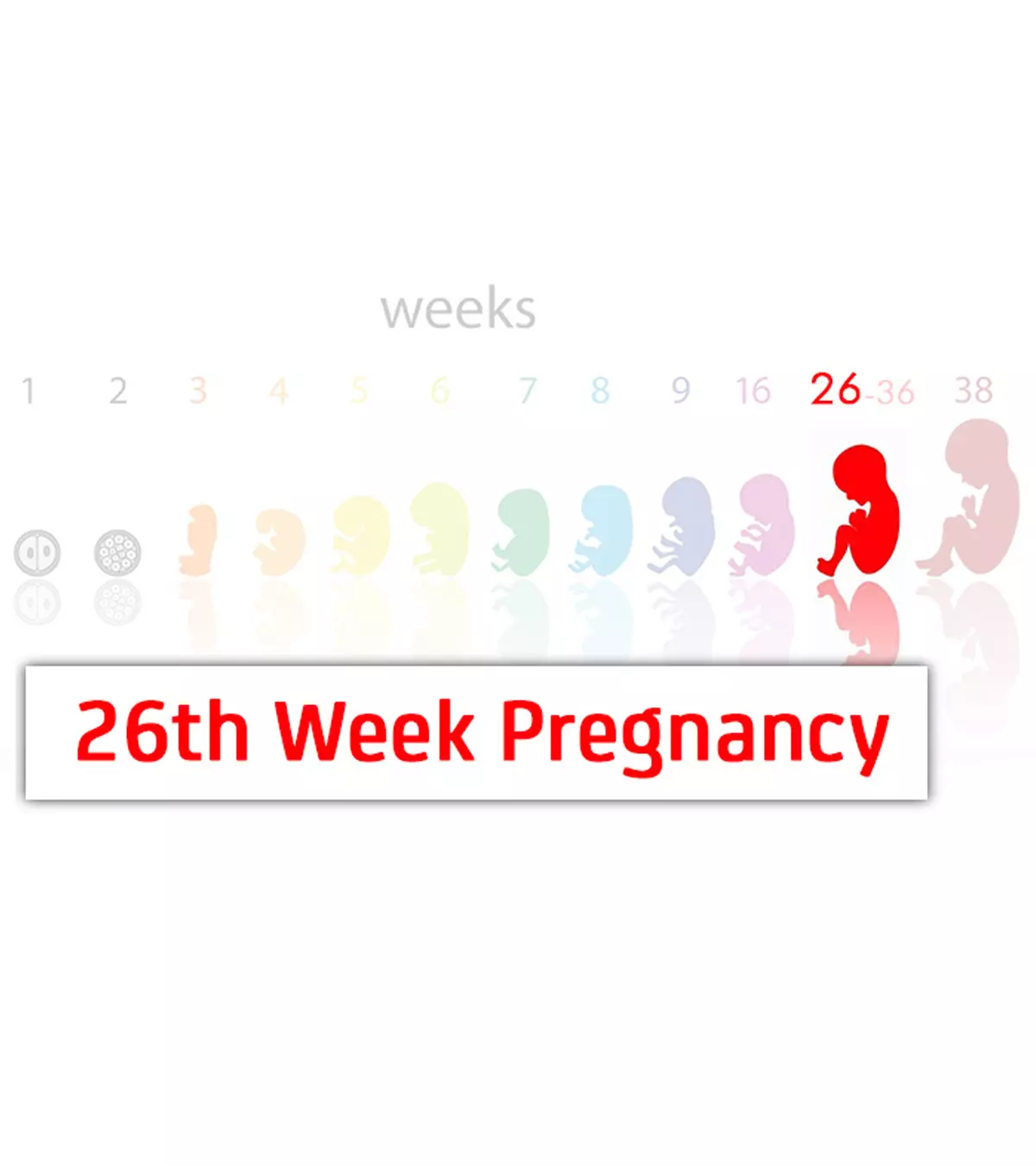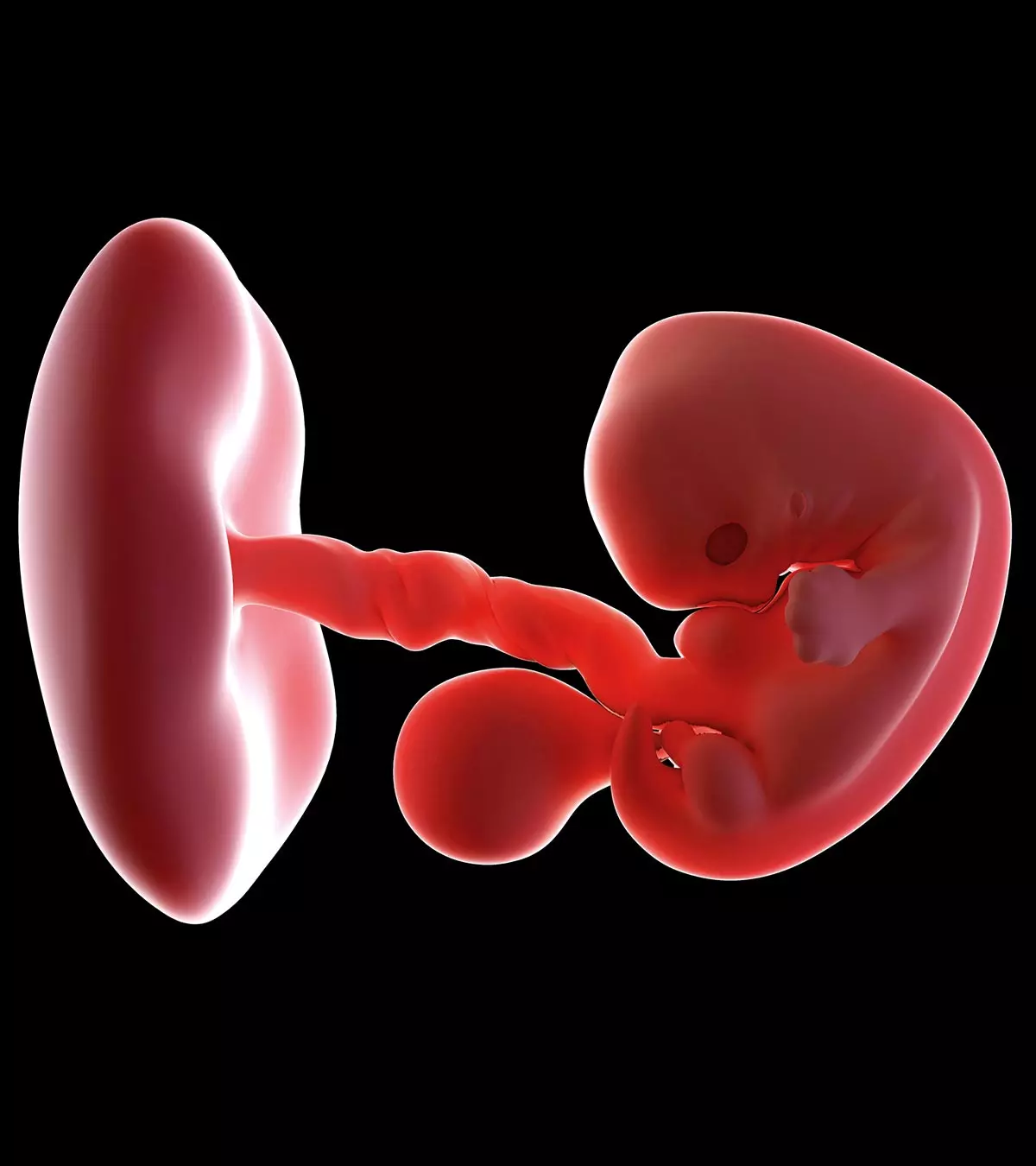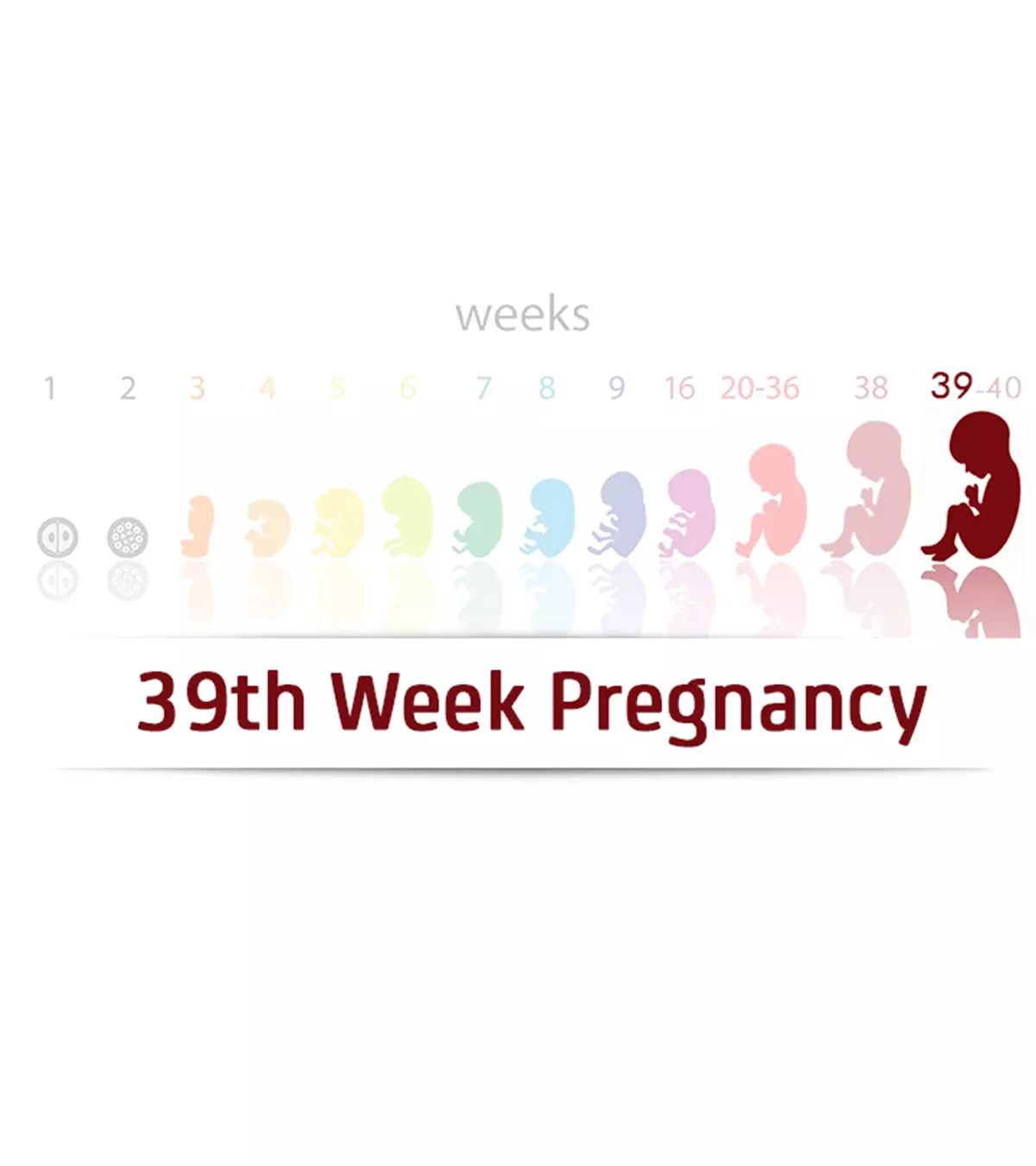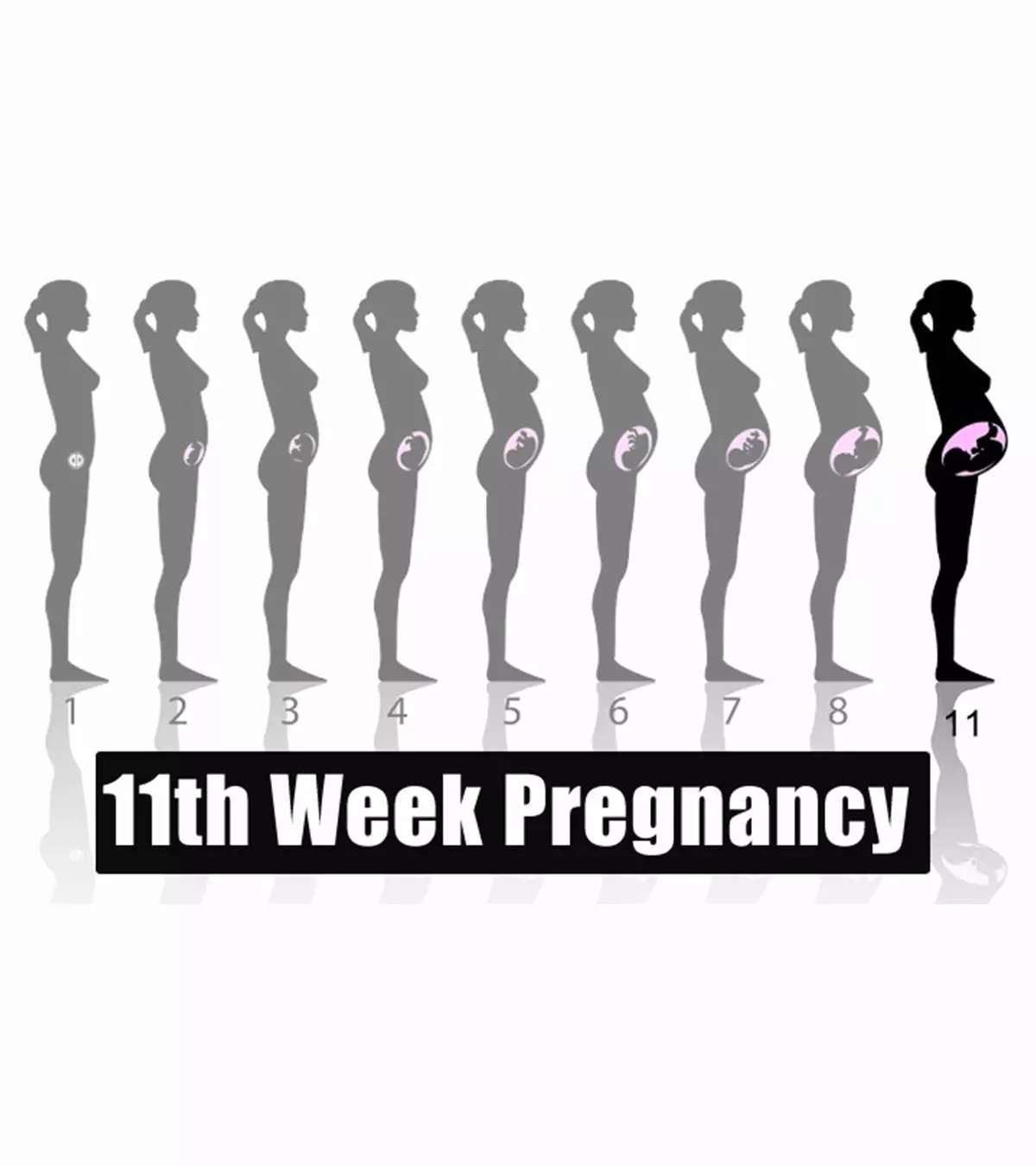
Image: Shutterstock

Key Pointers
- At 11 weeks, you are two and a half months pregnant, and your baby is the size of a Brussels sprout.
- The baby’s face attains human features at 11 weeks, with closed eyelids and the ability to open and close their hands into fists.
- Additionally, muscles and nerves are developing, and the heart is completely formed while the brain and nervous system are still developing.
- Symptoms you might experience at 11 weeks include frequent urination, vaginal discharge, heartburn, constipation, bloating, morning sickness, and food cravings.
- At 11 weeks, you might experience physical and emotional changes such as breast tenderness, skin darkening, visible pregnancy bump, anxiety, and mood swings.
- Your doctor may recommend a combined screening test involving an ultrasound scan and blood tests to assess the risk of chromosomal abnormalities in the baby.
How Many Months Pregnant Are You At 11 Weeks?
At 11 weeks, you are two-and-a-half months pregnant. You are just a few weeks away from entering the second trimester. Your baby starts to develop a human form, and you will hear your little one’s heartbeat for the first time with a specific stethoscope.
What else happens this week? Momjunction tells you about the development of the baby, the changes in your body, and the tips to follow in the 11th week of pregnancy.
How Big Is Your Baby At 11 Weeks
The baby is about the size of a Brussels sprout. Your baby measures 1.61in (4.1cm) in length and weighs about 0.25oz (7g) (1).
Next, find out how the baby develops inside at this time.
Baby’s Development At 11 Weeks
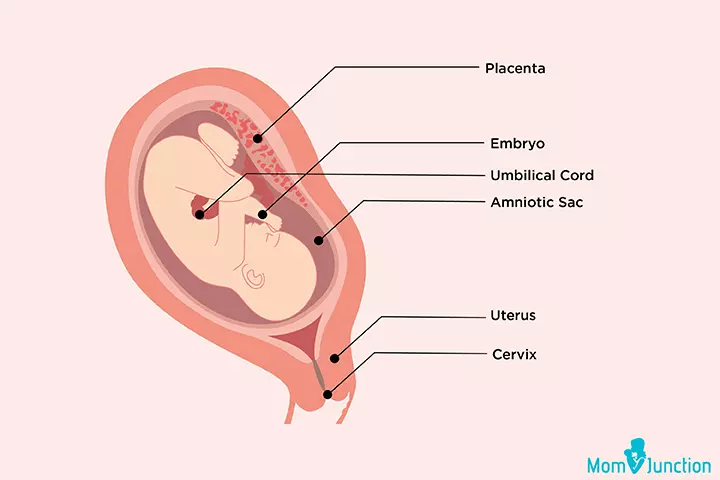
Here is how the baby’s body parts are developing this week.
| Body Parts | Development stage |
|---|---|
| Face | Attains the human facial features. Nose and lips are formed (2) |
| Eyelids | Remain closed |
| Hands | Open and close into fists (3) |
| Heart | Completely formed and starts pumping blood (4) |
| Nails | Finger and toenails are growing |
| Brain and Nervous system | Developing |
| Muscles | Developing and working together with the nerves, to trigger jerky movements that may not be felt by the mother |
| Mouth | Tooth buds start to develop (5) |
| Head | Large and about half the size of the body |
| Intestine | Starts absorbing glucose and water from the swallowed amniotic fluid |
| Genitals | Male and female genitals are distinguishable through an ultrasound scan |
With all these developments happening in your womb, how are you going to feel in this week of pregnancy? Keep reading to know.
Symptoms You Experience In The 11th Week Of Pregnancy

Image: Shutterstock
The symptoms include:
- Fatigue: As the body starts working extra, you feel more fatigued.
- Morning sickness: It starts easing by this week and the appetite increases.
Rebecca Roberts, a mother to 4 children and pregnant with baby number 5, shares about her 11-week symptoms during pregnancy. She says, “Nausea, something I hated, has subsided. My tiredness and overall fatigue have not completely gone, I just feel a little bit of tiredness. My breasts still feel a little tender, but I think that’s totally expected at 11 weeks. Also, I keep getting little breakouts on my skin (i).”
- Weight gain: Ideal weight gain in the first trimester (0-13 weeks), as per BMI, should be:
| BMI | Below 18.5 | 18.5 – 24.9 | 25 – 29.9 | 30 and Above |
|---|---|---|---|---|
| Weight gain | 2-6lb | Around 2-6lb | Around 2-6lb | 1-4lb |
- Food cravings and aversions: The hormonal fluctuations can increase your cravings and make you averse to some foods.
- Increased sensitivity to smells: The changes in hormones during pregnancy tend to make women hyperosmic to certain odors. For instance, the woman may become averse to smells that may be toxic to the baby.
- Constipation and bloating: The progesterone hormone relaxes the gastrointestinal tract that slows down digestion, making you feel bloated.
- Heartburn: Due to the hormonal changes, the muscles in the digestive tract relax, pushing the gastric acids towards the esophagus to cause heartburn.
- Leg cramps: Magnesium deficiency and the compression of the blood vessels due to the growing uterus can lead to leg cramps, commonly at night. Drinking a lot of water and frequently stretching your legs can help prevent cramps.
- Frequent urination: The growing uterus applies pressure on the bladder, which increases the frequency of urination.
- Vaginal discharge: A small amount of milky white or off-white discharge is usually noticed during this week.
These symptoms are indicators of the changes taking place in your body. More about it next.
Rebecca also shares about the round ligament pain she is experiencing during this week of pregnancy, “One thing which does bother me at night because I do still wake up in the night is I’m getting round ligament pain. Sometimes, it can be quite sharp, and it takes a little while for it to subside, about a minute sometimes. But it only occurs when I have been lying down and not during the day at all (i).”
 Quick fact
Quick factHow Your Body Changes In The 11th Week
Physical changes:
- Breast tenderness
- Pregnant belly – First-time moms may not find any change in the belly size, but second-time moms or moms pregnant with twins may show a small belly bump.
- Skin darkening
Emotional changes:
- Anxiety
- Mood swings
As most miscarriages happen in the first trimester, it is important to know if you have that risk.
When To Call The Doctor

Image: Shutterstock
Call the doctor in the case of (6):
- Fever (100.4 degrees or higher)
- Pelvic pain and /or lower abdominal and back pain.
- Less urination or dark-colored urine
- Pain on urination
- Severe vomiting
- Loss of consciousness
- Vaginal bleeding
- Severe headaches with blurred vision and epigastric pain or without them
- Fast or difficult breathing
- Feels ill
- Swelling of fingers, face and legs
If you do not have any such symptoms, carry on with the scheduled doctor’s visit for the week.
Your OB/GYN Visit
- Weight check-up
- Blood pressure
- Combined screening test: This screening test gauges your risk of carrying a baby with chromosomal abnormalities. The screening test includes an ultrasound scan and blood test among others (7):
i. Ultrasound for nuchal translucency: It is done to evaluate the risk of Down syndromeiA genetic condition where a person has an extra chromosome apparent through facial features, and speech and language problems. in babies, by checking the thickness of the skin behind the neck. The thicker the fluid, the greater is the risk of Down syndrome.

Image: Shutterstock
i. Ultrasound for nuchal translucency: It is done to evaluate the risk of Down syndromei in babies, by checking the thickness of the skin behind the neck. The thicker the fluid, the greater is the risk of Down syndrome. According to data from the Centers for Disease Control and Prevention (CDC), around 6,000 babies born in the United States annually, which is about one in 600 newborns, have Down syndrome.
ii. Nasal bone and gestational age determination: The ultrasound scan helps visualize the nasal bone and estimate the accurate gestation age of the fetus. In babies with Down syndrome, the nasal bone may not be clearly visible.
iii. Blood test: The simplest blood test measures the level of two compounds in your blood.
(a) PAPP-A (Pregnancy-associated plasma protein A): This is a type of protein produced by the placenta during early pregnancy.
(b) Human chorionic gonadotropin – This hormone is produced by the placenta in the early stages of pregnancy.
Abnormal levels of either compound indicate a risk of chromosomal abnormalities in the baby.
The results of all the three tests are combined to evaluate the risk of Trisomy 18 and Down syndrome in babies. If the results are not normal, additional tests such as amniocentesisiA medical procedure that involves taking an amniotic fluid sample from the uterus to check for chromosomal or genetic disorders. , cell-free fetal DNAiTest to determine the likelihood of the fetus developing a chromosomal disorder. , chorionic villus samplingiPrenatal diagnostic methods used to detect fetal abnormalities by taking a sample of the placental tissue. , or ultrasounds are recommended.
There are more advanced tests for evaluation of all the chromosomes with higher prediction rate of anomalies. Always consult your doctor to know about the test that suits you and your age.
The physical and mental well being of the mom is necessary for the proper development of your child. Keep reading for tips on taking care of yourself at this time.
Tips For The Mom-to-be
You may follow the below tips during the 11th week:
- Drink a lot of water to stay hydrated.
- Stick to a healthy lifestyle and eat home-cooked food to ensure you get proper nutrition. Stay away from raw, under cooked, and fried foods.
- Avoid swordfish, shark, king mackerel, or tile fish, which are high in mercury.
- Carry fruits and snacks with you, if you are a working woman.
- Avoid smoking and drinking alcohol.
- Avoid too much caffeine as it can affect the growth of the fetus.
- Take prenatal vitamin supplements for folic acidiVitamin B complex nutrient that helps in cell growth and is found in foods such as spinach, beans, and nuts. and iron.
- Engaging in moderate physical activities like walking after consulting your doctor can help prepare you for childbirth or delivery and may even result in shorter labor.
- Stay calm and keep stress at bay.
- Use moisturizers to prevent itchy and dry skin.
- Do not take any medication without the doctor’s permission.
- Wear loose, breathable clothes and switch to nursing bras for supporting the enlarged breasts.
- Wear comfortable shoes or slippers.
- Spend more time with family and friends.
 Quick tip
Quick tipMost importantly, get all the help you can from the dad-to-be.
Tips For Dad-to-be

Image: Shutterstock
Here’s what your partner can do:
- Create a good environment at home.
- Attend all the prenatal visits.
- Share the household responsibilities.
- Take the initiative to plan maternal shopping and outings
- Give a good neck and foot massage.
Frequently Asked Questions
1. How do I know if my fetus is alive?
At 11 weeks of pregnancy, your baby is no longer an embryo and a fetus. It is, however, too early to feel your baby’s movement in your belly. The first ultrasound examination, also known as a dating scan, can be performed to check your fetal growth and development (8).
2. Are 11 weeks the same as 3 months?
No. Being 11 weeks pregnant means you’re just one week away from being three months pregnant and it is the end of the first trimester.
3. Can I find out the sex of the baby during the 11th week of pregnancy?
The fetus is assigned the sex by 9th week of pregnancy, however, it is not yet visible on the ultrasound and the scan to determine the sex is usually carried out during the second trimester (3).
4. How much weight should a woman expect to gain during the 11th week of pregnancy?
Normally during the first trimester women gain 2 to 4 pounds which is 1 to 2 kilograms (11).
5. Are there any potential risks associated with flying during the 11th week of pregnancy?
No, as long as there are no pregnancy-related issues , traveling by air is not an issue. However, the second trimester is thought to be more preferable for traveling since by this time the morning sickness period would have ended (12).
At the 11th week of pregnancy, you are still adapting to the changes brought on by pregnancy. Since your baby is growing quickly, you will be feeling a range of pregnancy-related symptoms, including emotional changes. You should look after yourself and the baby and get all the help from your partner, family, and healthcare provider. Contact your doctor if you have any worries, anxieties, or severe symptoms such as fever, severe vomiting, and breathing difficulty. Otherwise, go forward with your scheduled doctor’s appointment for the week.
Infographic: Fetal Development At 11 Weeks Of Pregnancy
By 11 weeks of pregnancy, your fetus will have a more human-like appearance and be as big as a brussel sprout. Check out the infographic below to learn about fetal developments during 11 weeks of pregnancy. Knowing these developments can make you feel happy and informed about your baby’s growth.

Illustration: Momjunction Design Team
Learn about the size of your baby and their development at 11 weeks pregnant. Discover what to expect and how your baby is growing!
Personal Experience: Source
MomJunction articles include first-hand experiences to provide you with better insights through real-life narratives. Here are the sources of personal accounts referenced in this article.
1. 11 Weeks pregnant | Pregnancy update | Morning sickness pregnancy cravings | VLOG Rebecca Roberts;https://www.youtube.com/watch?feature=shared&v=q5hzSgkEq5E
References
- Fetal Development.
https://embryology.med.unsw.edu.au/embryology/index.php/Fetal_Development - Prenatal Form and Function – The Making of an Earth Suit.
https://www.ehd.org/dev_article_unit11.php - Fetal Development: Stages of Growth.
https://my.clevelandclinic.org/health/articles/7247-fetal-development-stages-of-growth - 11 weeks pregnant.
https://raisingchildren.net.au/pregnancy/week-by-week/first-trimester/11-weeks - Fetal development.
https://medlineplus.gov/ency/article/002398.htm - Warning signs during pregnancy.
https://www.pregnancybirthbaby.org.au/warning-signs-during-pregnancy - Common Tests During Pregnancy.
https://www.hopkinsmedicine.org/health/wellness-and-prevention/common-tests-during-pregnancy - Week 11 – your 1st trimester.
https://www.nhs.uk/start-for-life/pregnancy/week-by-week-guide-to-pregnancy/1st-trimester/week-11/ - 11 weeks pregnant: baby’s development, feeling hot and your rights at work.
https://www.tommys.org/pregnancy-information/im-pregnant/pregnancy-week-by-week/11-weeks-pregnant - Do’s and don’ts during the first trimester of pregnancy.
https://news.sanfordhealth.org/womens/dos-and-donts-during-first-trimester-pregnancy/ - Managing your weight gain during pregnancy
https://medlineplus.gov/ency/patientinstructions/000603.htm#:~:text=Most%20will%20gain%202%20to - Travel during pregnancy.
https://americanpregnancy.org/healthy-pregnancy/is-it-safe/travel-during-pregnancy/
Community Experiences
Join the conversation and become a part of our nurturing community! Share your stories, experiences, and insights to connect with fellow parents.
Read full bio of Dr. Mozhgan Sayyad
Read full bio of Sakshi Mishra
Read full bio of Rebecca Malachi
Read full bio of Aneesha Amonz






